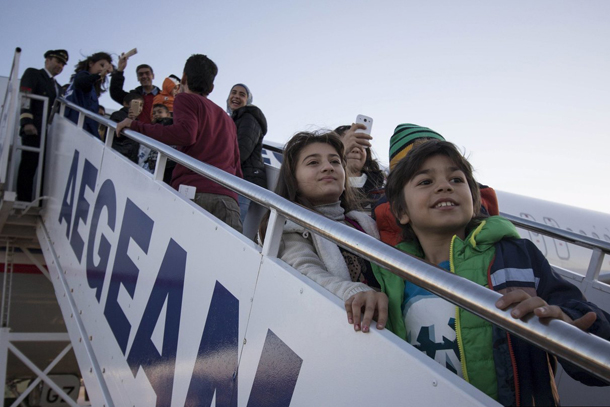The attacks in Paris last week set off a world-wide flood of empathy and solidarity. Canadians attended vigils, lit monuments in the tricolour and mourned the loss of life and normalcy in the City of Love.
However, grief quickly turned into anger, inciting the inevitable search for a scapegoat. Shocking instances of violence against mosques and Muslims have been reported around the world, including a fire at a mosque in Peterborough, Ontario. Xenophobic acts are not an uncommon public reaction; a spike in attacks on Muslims following terrorist attacks has been well studied and documented.
In Canada, despite the objective lack of connection, politicians began sounding off "security concerns" related to incoming Syrian refugees. Saskatchewan's Premier Brad Wall called for a delay in resettling Syrian refugees. Premier Christy Clark of British Columbia stated the obvious: that the government needs to ensure that security checks are done on every refugee. These statements demonstrate a clear lack of understanding by government officials of Canada's process for resettled refugees.
Contrary to the influx of migrants crossing into Europe over the past months, Canada is resettling pre-screened refugees who have been approved for permanent residency by a Canadian visa officer abroad. The process is thorough and involves international and national law enforcement agencies.
How security screening works
Refugees who may be eligible for resettlement are first identified by the UN High Commissioner for Refugees (UNHCR), primarily on the basis of their vulnerability. International refugee law is clear that those responsible for serious criminal and terrorist acts will not benefit from refugee protection.
Given the limited number of refugees developed countries are willing to settle, only one to two per cent of individuals registered with the UNHCR get referred into the potential resettlement pool despite tens of thousands more who would qualify.* Anyone with a hint of criminal or terrorism connections is simply not placed into the pool for further assessment; priority is given to the most vulnerable.
Next, a UNHCR officer conducts a file analysis. Officers in the Beirut UNHCR office are exceptionally knowledgeable about the events in Syria, the various factions and the timeline of the conflict. This allows for a robust credibility assessment of the facts alleged by the individual. At this point, anyone who the officer identifies as having security or criminal concerns would again be filtered out.
If a file progresses onwards, in general, a UNHCR officer is then tasked with conducting a "refugee status determination." This includes an interview where the truth of their allegations and their background is fulsomely assessed.
If facts related to criminality or terrorism come to light after the interview, the UNCHR also has a process for cancelling refugee status.
If an individual passes this assessment, the UNHCR can refer the file to a Canadian visa officer who will again interview the person. In each case, the visa officer will assess whether the person meets the definition of a refugee.
The individual is then screened for "admissibility" to Canada. Medical and criminal screening is mandatory. A security review involves, at a minimum, the coordination of Canada Border Services Agency, the Royal Canadian Mounted Police and the Canadian Security Intelligence Service. Information is often sought from third party states, international organizations and searches conducted in international databases.
Canada's time for action
Earlier this year, it was revealed that the Prime Minister's Office had suspended the processing of Syrian refugees citing security concerns. The details of this secret audit were never fully revealed, however according to a spokesperson for then minister Chris Alexander, the Canadian government resumed the processing of Syrian Government Assisted Refugees "only after there was confidence that our procedures were adequate to identify those vulnerable persons in most need of protection while screening out threats to Canada."
When evaluating security threats, Canadians would do well to look at the evidence. All of the identified attackers from Paris appear to be Belgian or French nationals, yet no politician has suggested increased screening of European visitors or immigrants to Canada. Studies out of the University of British Columbia, the University of Toronto and Harvard University link an increase in immigration to a decrease in crime.
Statistics Canada data suggests that the percentage of new immigrants in Toronto and Montreal neighbourhoods is inversely proportional to all types of violent crime.
Equating refugees with a security risk is ill-informed and inflammatory. Syrian refugees are fleeing the same brutality and cruelty that was inflicted on Parisians this past week. The commitment to resettle 25,000 refugees was a breath of fresh air after years of obfuscation and unconscionable government delays on this file. Violence against innocent civilians should strengthen our resolve to offer safe haven to war's victims, not delay it. ![]()
*Story clarified Nov. 19 at 1:00 p.m.
Read more: Rights + Justice, Politics, Federal Politics















Tyee Commenting Guidelines
Comments that violate guidelines risk being deleted, and violations may result in a temporary or permanent user ban. Maintain the spirit of good conversation to stay in the discussion.
*Please note The Tyee is not a forum for spreading misinformation about COVID-19, denying its existence or minimizing its risk to public health.
Do:
Do not: